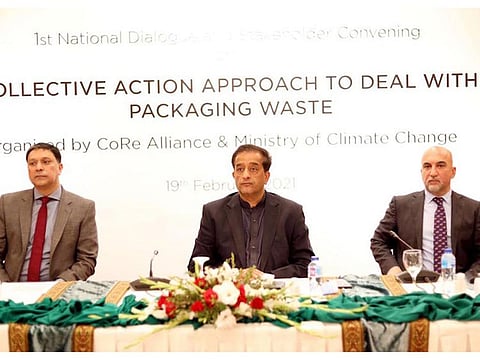Pakistan to support innovative recycling solutions to tackle plastic pollution
Climate Change advisor calls for innovative solutions for waste collection and recycling

Islamabad: Pakistan’s climate change ministry has announced full support for innovative recycling initiatives to tackle the country’s mounting waste problem and promote an eco-friendly environment.
“All-out support would be provided to those manufacturers and producers, who would introduce innovative solutions for plastic waste collection and recycling” vowed Syed Mujtaba Hussain, the senior joint secretary at the ministry of climate change who is also leading anti-plastic bag campaign in Islamabad. Collaboration with the local innovators, industry and governmental organisations is a priority for the ministry to help develop a systemic solution to promote the transition towards a circular economy for plastics, he said.
Let’s face the fact that plastic is here to say which means we need to rethink our approach to waste management, he said. “Managing plastic waste requires us to not only reduce, reuse and recycle but also rethink innovative solutions to the menace of menace plastic waste and turn it into a economic resource.”
PM’s special assistant on Climate Change, Malik Amin Aslam, urged the plastic producers to play their part in managing the menace of plastic waste in a sustainable manner as it poses a serious threat to public health and the environment. “It is shocking to note that over 70 percent (2.6 million tons) of the plastic waste generated in the country is not recycled and ends up in the municipal waste stream” and only 25-30 per cent of the plastic waste is managed by the informal recycling sector, Amin Aslam said citing official studies.
Collaboration crucial
Addressing a national dialogue on plastic waste management, the premier’s aide said that government is committed to tackling the growing environmental menace of plastic waste and has initiated several policies under PM Imran Khan’s vision for Clean Green Pakistan.
However, he cautioned that government’s efforts for sustainable plastic waste management are “unlikely to achieve any desired results as long as the various stakeholders, involved in manufacturing, sale and use of plastic materials, contribute” to reduce plastic pollution.
The beverage companies are responsible for the majority of the plastic waste that ends up in the landfills, and urged the firms to shift to recycling, he shared.
“Pakistan has a long way to go in tackling the challenge of plastic waste and this cannot be achieved without the support and collaboration of all stakeholders both in the public and private sectors” the climate change advisor said.
Plastic use on the rise
Pakistan has the highest percentage of mismanaged plastic in South Asia, according to ministry deputy director Dr Zaigham Abbas. Pakistan’s annual plastic waste generation in 2020 was around 3.9 million tons, which is expected to increase to 6.12 million tons per annum by year 2050 as the use of plastic materials is on the rise. Nearly 70 percent of the colossal plastic waste ends in landfills, unmanaged dumps or strewn about land and water bodies, clogging drains or degrading the fertile lands, Aslam said. Pakistan currently has the capacity and facilities to recycle only 33 per cent of the waste generated across the country.
The seminar jointly organized by the Ministry of Climate Change and the Pakistan Collect and Recycle (CoRe) alliance, brought together environmentalists, policymakers and companies to develop joint solutions for sustainable collection and disposal of plastic waste.
Sign up for the Daily Briefing
Get the latest news and updates straight to your inbox






